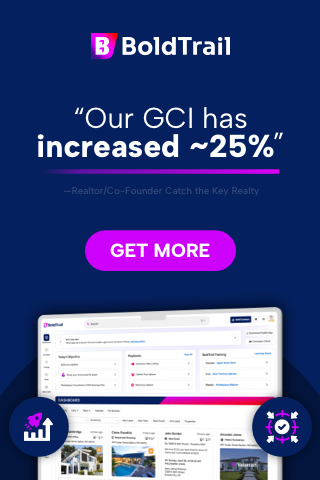Why Understanding CRM Differences Could Make or Break Your Real Estate Business
Before diving into the specific differences, let’s establish why this choice matters more than ever in 2025. Recent industry data reveals some eye-opening statistics:
- CRM systems boost real estate sales productivity by 26.4% and generate a return of $8.71 for every dollar invested
- Agents using appropriate CRM tools report a 50% increase in efficiency and faster response times
- 87% of real estate deals are lost due to poor follow-ups, which proper CRM selection can prevent
- Real estate professionals using the wrong CRM type experience 30% lower adoption rates and waste an average of 2.5 hours per week on workarounds
The stakes have never been higher. With the real estate market becoming increasingly competitive and data-driven, your CRM choice directly impacts your ability to capture leads, nurture relationships, and close deals efficiently.
The 5 Critical Differences Between Brokerage CRM and Individual Agent CRM
1. Lead Management and Distribution Philosophy
Individual Agent CRM Focus:
Individual agent CRMs are designed around personal lead ownership and individual relationship management. These systems excel at:
- Personal lead capture from individual marketing efforts
- One-to-one client relationship tracking
- Personal pipeline management
- Individual performance analytics
- Simplified, single-user interfaces
Brokerage CRM Focus:
Brokerage CRMs prioritize team collaboration and strategic lead distribution. Key capabilities include:
- Intelligent lead routing based on agent specialization, geography, and availability
- Team-wide lead pools and shared prospect databases
- Multi-agent pipeline visibility and management
- Comprehensive team performance dashboards
- Advanced permission controls and data security
2. Scalability and User Management
This difference often becomes the breaking point for growing real estate businesses.
| Feature | Individual Agent CRM | Brokerage CRM |
|---|---|---|
| User Capacity | 1-5 users typically | Unlimited or high-volume scaling |
| Role Management | Basic user permissions | Complex role hierarchies (agents, managers, admins) |
| Data Segregation | Personal data ownership | Territory-based and team-based data sharing |
| Customization Scope | Individual workflow optimization | Enterprise-wide process standardization |
| Integration Complexity | Simple, personal tool connections | Enterprise integrations with multiple systems |
3. Reporting and Analytics Capabilities
The analytical needs of individual agents versus brokerages are fundamentally different, requiring distinct reporting architectures.
Individual Agent Analytics:
- Personal Performance Metrics: Individual conversion rates, response times, and deal cycles
- Source Attribution: Which marketing channels generate the best leads for that specific agent
- Client Lifecycle Tracking: Detailed journey mapping for personal client relationships
- ROI Calculations: Personal marketing spend effectiveness and commission tracking
Brokerage Analytics:
- Team Comparison Reports: Agent performance benchmarking and ranking systems
- Market Territory Analysis: Geographic performance data and market penetration insights
- Resource Allocation Insights: Lead distribution effectiveness and team utilization rates
- Predictive Forecasting: Pipeline analysis across multiple agents and market trends
- Commission and Revenue Tracking: Complex split calculations and brokerage profitability analysis
4. Integration and Workflow Management
The complexity and scope of integrations vary dramatically between individual and brokerage needs.
5. Cost Structure and ROI Considerations
Understanding the total cost of ownership reveals why the cheapest option often becomes the most expensive mistake.
Individual Agent CRM Costs:
- Lower monthly fees: Typically $30-100 per month
- Minimal setup costs: Often self-implemented
- Personal training investment: Individual learning curve
- Limited scalability costs: May require system changes as business grows
Brokerage CRM Costs:
- Higher per-user fees: Typically $50-200+ per user per month
- Implementation investment: Professional setup and customization
- Team training programs: Comprehensive onboarding across multiple users
- Long-term scalability value: Built to grow with expanding operations
Frequently Asked Questions About Brokerage vs Individual Agent CRMs
Q: Can an individual agent use a brokerage-level CRM effectively?
Absolutely! In fact, ambitious individual agents often benefit from brokerage-level CRMs because they provide room for growth. However, they may pay for features they don’t immediately need. The key is evaluating your 2-3 year growth plans. If you’re planning to build a team or join a larger brokerage, starting with a scalable solution makes sense.
Q: What happens when a brokerage tries to use individual agent CRMs?
This typically results in data fragmentation, inconsistent processes, and missed collaboration opportunities. You’ll often see multiple separate databases, difficulty in lead hand-offs, and inability to implement company-wide standards. Most brokerages attempting this approach eventually migrate to proper brokerage solutions within 12-18 months.
Q: How do I know when it’s time to upgrade from individual to brokerage CRM?
Consider upgrading when you experience any of these scenarios:
- Managing more than 3-5 team members
- Need to implement lead distribution systems
- Require detailed team performance comparisons
- Want to standardize processes across multiple agents
- Need advanced permission controls for data security
Q: Can brokerage CRMs handle individual agent needs within a team structure?
Yes, modern brokerage CRMs are designed with individual agent dashboards and personal pipeline views while maintaining team oversight capabilities. Agents get their personalized workspace while brokers maintain visibility and control over team performance and lead distribution.
Q: What’s the biggest mistake real estate professionals make when choosing between these CRM types?
The most common mistake is choosing based solely on current needs without considering growth plans. Many individual agents select simple CRMs and later face expensive migration costs when scaling. Conversely, some small brokerages over-invest in complex enterprise solutions that overwhelm their current capabilities.
Making the Right Choice: Your Decision Framework
To determine which CRM type aligns with your business model, honestly evaluate these critical factors:
Choose Individual Agent CRM If:
- You’re a solo agent with no immediate plans for team growth
- Your annual transaction volume is under 25 deals
- You prefer complete control over your data and processes
- Budget constraints require minimal monthly investment
- You value simplicity over advanced features
Choose Brokerage CRM If:
- You manage or plan to manage multiple agents
- Lead distribution and team collaboration are priorities
- You need comprehensive reporting across multiple users
- Compliance and data security are critical concerns
- You’re planning significant business growth within 2-3 years
Top Recommended Solutions by Category
Leading Individual Agent CRMs for 2025:
- HubSpot CRM: Excellent free tier with robust features for growing agents
- Pipedrive: Visual pipeline management perfect for solo agents
- Wise Agent: Real estate-specific features at agent-friendly pricing
- LionDesk: Comprehensive communication tools for relationship building
Leading Brokerage CRMs for 2025:
- BoldTrail: Comprehensive brokerage platform with advanced lead distribution
- Chime: Enterprise-level features with extensive customization
- Follow Up Boss: Team-focused design with powerful collaboration tools
- Top Producer: Established solution with deep real estate industry integration
Your Next Steps: Implementing the Right CRM Strategy
Now that you understand the critical differences, here’s your action plan for making the right choice:
- Assess Your Current Situation: Honestly evaluate your team size, transaction volume, and growth trajectory
- Define Your Must-Have Features: List the capabilities that directly impact your revenue generation
- Calculate Total Cost of Ownership: Include implementation, training, and potential migration costs
- Test Before Committing: Take advantage of free trials to evaluate user adoption and workflow fit
- Plan for Growth: Choose a solution that can evolve with your business for at least 3 years
- Invest in Proper Implementation: Budget for training and setup to maximize adoption and ROI
The real estate industry rewards those who leverage technology strategically. By understanding the fundamental differences between brokerage and individual agent CRMs, you’re positioning yourself to make a choice that will compound your success for years to come.
Remember, the best CRM isn’t the one with the most features—it’s the one that aligns with your business model, supports your growth plans, and gets adopted consistently by your team. Take the time to make this decision thoughtfully, and it will pay dividends throughout your real estate career.

